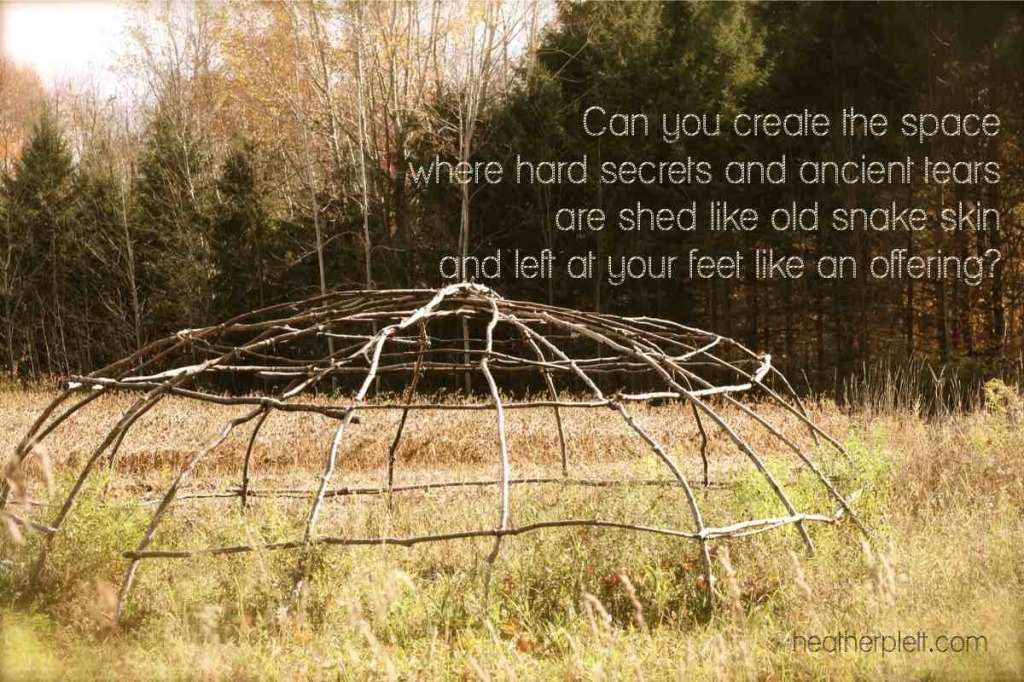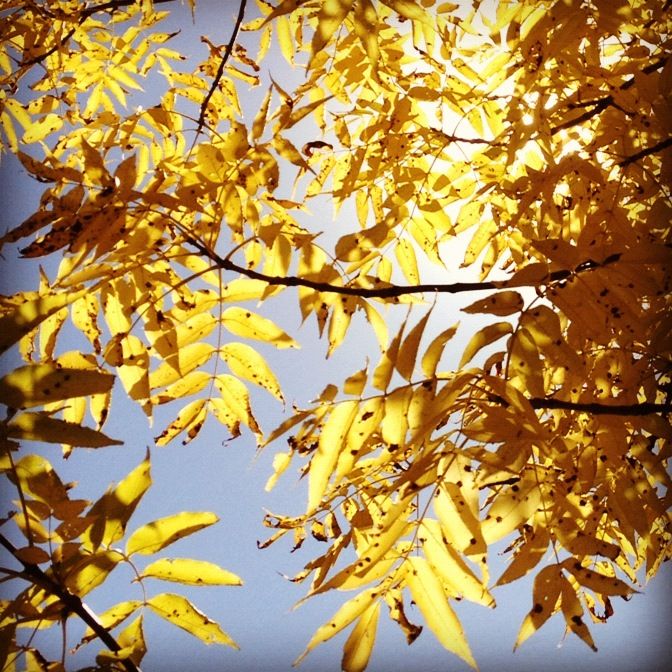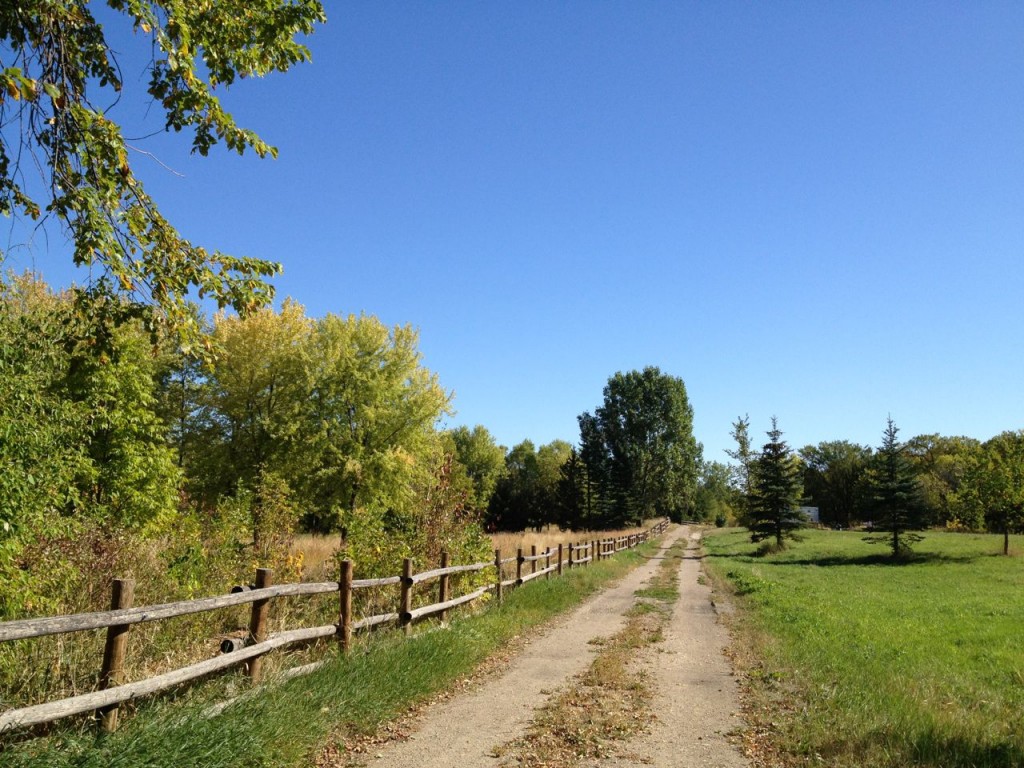by Heather Plett | Feb 6, 2015 | circle, journey, Labyrinth

I want to tell you about last weekend’s sweat lodge, but each time I sit down to write something, I delete it. The words just don’t come out right. This was an experience beyond words.
What I’m about to share doesn’t come close to expressing it, but it’s the closest I’ve come…
It was intense. It was emotional. It was hard. It was frightening. It challenged me in ways I didn’t expect to be challenged.
I didn’t last inside the whole time. It was too much for me – the tightness, the steam, the extreme heat, the intensity of the drumming and singing, the bodies too close together, the emotions, the fear, my own tendency toward claustrophobia, the memories of trauma. I came out, sat (shaking and weeping) for awhile, and thought I’d go back in, but I couldn’t. When I climbed back inside the open door, my whole body went into panic mode and I had to remove myself.
All I could do was sit outside and weep. I wept and wept. I couldn’t stop the weeping. There was so much that my body wanted to release. Some of it was my own fear, trauma, and grief, and some of it was as ancient as the stones at the centre of the sweat lodge. I was carrying something bigger than myself.
And then, in between the body-wrenching sobs, there was something else. An invitation. A calling. A longing.
There was a whisper in the steam and the drumming and the tears. “It’s time,” it said. “It’s your turn to step forward and become a warrior. It’s your turn to be brave, to be fierce, and to be strong. The earth that you sit on needs you to be. The people you gather in circle need you to be. Your racism-scarred city needs you to be. Everyone is waiting for you to be a warrior.
“But first you have to face this fear. First you have to hold this grief. First you have to prove to yourself that you are strong enough for what this work will require of you.”
That’s why I spent the next few days in silence. Because the sweat lodge is asking much of me.
This is the first piece of writing that emerged, two days after the experience.
Invitation from a sweat lodge
Can you carry the sadness of the world
in your tattered basket
without being pulled in
and smothered by its hungry hands?
Can you hold the container for others,
tenderly weaving the edges so they hold fast,
while trusting that you are held
by invisible hands?
Can you create the space
where hard secrets and ancient tears
are shed like old snake skin
and left at your feet like an offering?
Can you enter the story
without the story consuming you?
Can you walk through the door
without losing your Self?
Can you crack open your heart
and let the tears flow
when the basket becomes too heavy
and the sadness needs to spill out through you?
Can you hold the inherited ache
of your burning sisters
and silenced mothers
without wounding your growing daughters?
Can you sit on the earth,
feel Her deep pain and betrayal
and let it vibrate through your body
without letting it shatter you?
Can you be the storycatcher,
the fire-eater,
the wound-carrier,
without being consumed by the flames?
Though I spent quite a bit of time in solitary silence after the sweat, I knew enough about this kind of deep journey work to know that I needed support. I sent a message to four people who would hold me from afar – an Indigenous elder, a reiki healer, a soulsister/mentor, and a co-host in conversations about trauma and grief. As soon as I shared it with them, I felt lighter and more able to move forward.
Those four women created a container to hold what I was going through. They prayed, they sent messages to check on me, and they cheered me on from afar.
Once again, I am reminded of how important these circles of support are. We need our communities. We need to serve as each other’s containers when we go through difficult journeys. We need to stand side-by-side as we do hard work. We need to find the people with whom, as the quote at the top of the page says, “we can sit down and weep and still be counted as warriors.”
I can become a warrior because I stand shoulder to shoulder with other warriors.
If you are on a similar journey, going deeper into your own calling, excavating the depths of your most authentic self, I want to help create a container for your growth. That’s why I’ve re-opened Pathfinder Circle. This feels like urgent work. We need more changemakers to stand shoulder to shoulder, holding each other when we are weak and cheering each other when we triumph.
It is my hope that six people who want to do deep work, to tap into their own longings and calling, will come together in a virtual space and support, challenge, and encourage each other. Will you be one of them?
by Heather Plett | Sep 24, 2012 | journey, practice

Yesterday, Ronna Detrick and I (and the women who’d gathered in circle with us) had a heart-opening conversation about pilgrimage, community, story-telling, and feminine spirituality. (You can listen to the recording here.) I love having conversations like this because, even if I’m the one doing the teaching, I always end up walking away with more clarity than I had before.
At the end of the call, after I’d shared several stories of the “hardships, darkness, and peril” along my own pilgrimage, Ronna asked me to talk about how I hang onto hope in the middle of the dark times.
It’s a timely question for me, and it’s been on my mind since our conversation. As much for myself as for you, the following are some reminders of how to reach for hope when life knocks us off our feet.
1.) Find community. I can’t stress this strongly enough. You NEED community. You need a circle of people who will support you and who won’t judge you when you’re falling apart. You need to let yourself be held when you’re not feeling strong enough to walk on your own. There is no weakness in admitting that you need other people.
2.) Find wild spaces to wander in. When I’m falling apart and hardly know how to articulate the depths of the pain, I head to the woods or the riverbank. I find the Goddess there, in the most unexpected ways – in the wind, in the waves on the river, in the twinkling light reflected off the water, in the eyes of the deer who stands and stares at me. I think the Goddess is especially comfortable showing up in wild spaces because she has a wild heart herself. I feel comforted and more alive when I step out of the woods and return to my hope.
3.) Rest. It’s always important to rest, but when you’re going through especially difficult times, you need to find even more rest than usual. Deep, soulful rest that replenishes your strength. Take naps and hot baths, curl up with a good book, let people do some of your chores for you – just rest.
4.) Give yourself permission to cry. A social worker once told me that tears are the window-washers of the soul. It might sound a little corny, but it’s true. The tears help clean us and they help improve our vision. Let those deep sobs erupt from your belly and don’t try to keep them inside. Tears held in for too long will drown you.
5.) Find spiritual practices that sustain you. I’ve said this many times and I’ll say it again – spiritual practices are especially necessary when your pilgrimage gets difficult. Your spiritual practice can be as unique as you are – dancing, singing, walking, painting, praying, meditating, yoga, or photography. These practices shift us out of our left-brain thought processes that want to fix our problems or find logic in them or rush through them to the next easy place on the journey. Inside the practice, we rest in the unknowing space, where the problems serve as our teachers rather than our adversaries.
by Heather Plett | Sep 22, 2012 | journey, Labyrinth

This story has no clear beginning and no clear ending. It’s a pilgrimage story, and without going all the way back to the beginning of my life (and even the lives that were lived before mine that thread through mine), or waiting until I’m ready to die, I can only tell you about a small portion of that pilgrimage.
This week I’ve been revisiting my memoir, hoping to bring it to completion and eventually get it published. I set it aside months ago, thinking it was almost finished, but feeling like I might still be missing a piece of the puzzle.
I think I’ve found that puzzle piece. It started with adding the above words to the beginning. The story is now a pilgrimage story, with no clear beginning and no clear ending.
It used to be simpler. The very first time I tried to write it, it was about the three week period in the hospital waiting for Matthew to be born, and how that impacted me in a deeply spiritual way. The second time I wrote it, it was about a ten year transformation in my life, starting with the arrival of Matthew in my life. I was comparing myself to a caterpillar, going into a cocoon for ten years and eventually emerging as a butterfly. Or Theseus, heading into the labyrinth holding the thread, slaying the minotaur, and emerging victorious. And they all lived happily ever after. The end.
But now, after months of contemplation, I know that it’s not that straight-forward. Transformation is not a clean and simple thing that we can put into time frames or boxes. I’m still transforming. I’m still being stretched. I’m still not a butterfly. I’m heading back into that labyrinth again and again.
And so I am more satisfied calling my journey a pilgrimage. My son’s death was one of a long series of initiations, each one taking me deeper and deeper into my own heart. Each one teaching me how little I actually know. Each one revealing something new about God.
Now I am at a new place in the journey. In past initiations on this pilgrimage, I have lost my innocence, lost a son, lost a father, nearly lost a husband more than once, lost a father-in-law, and lost all of my grandparents. (Incidentally, nearly all of those things happened around this time of year.) I have fought the minotaur many times and returned from the labyrinth scarred and yet stronger. I expect my next initiation will be to learn what it’s like to lose a mother.
My responsibility as a pilgrim is simply to put one foot in front of the other and keep following the path. When the labyrinths appear along the path, I need to trust that a sword and a thread will be provided to help me survive.
If you’re interested in being part of a conversation about life as pilgrimage, join me tomorrow morning as I talk to my friend Ronna Detrick on her virtual Sunday Service at 10 am PST.
Most of us arrive at a sense of self and vocation only after a long journey through alien lands. But this journey bears no resemblance to the trouble-free ‘travel packages’ sold by the tourism industry. It is more akin to the ancient tradition of pilgrimage – ‘a transformative journey to a sacred center’ full of hardships, darkness, and peril. – Parker Palmer, Let your Life Speak



